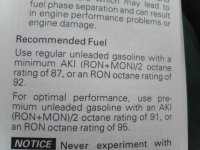I did over 50 fill-ups on my trip to California and back for the data I present. Mostly highway miles with cruise control set.
Here is what Wikipedia says about the Ethanol to Gasoline comparison (which is pretty typical of what you'll find from other sources).
Wikipedia
"1.5 gallons of ethanol has the same energy content as 1.0 gallon of gasoline. A flex-fuel vehicle will experience about 76% of the fuel mileage MPG when using E85 (85% ethanol) products as compared to 100% gasoline. ... Pure ethanol provides 2/3 of the heat value available in pure gasoline."
And ethanol is definitely NOT cheaper than gasoline. It costs a fair amount more to produce 1 gallon of ethanol than it does to produce 1 gallon of gasoline. The difference in price comes from your tax dollars subsidizing ethanol so that it APPEARS less expensive because the price at the pump is less. But the total price being paid is higher (part of the total cost being hidden because it's being removed from another pocket).
Then you have the billions of dollars of damage done to vehicle components because of ethanol, the short storage time, ethanol's affinity for water, etc., none of it good. So, we are using a more expensive, yet inferior product.
We are told that ethanol pollutes less than gasoline. And that is true if you just look at the tail pipe pollution produced by both. But when you take into consideration the entire process of planting, fertilizing, processing and transporting ethanol, it is not clear at all that there is an overall pollution advantage.

